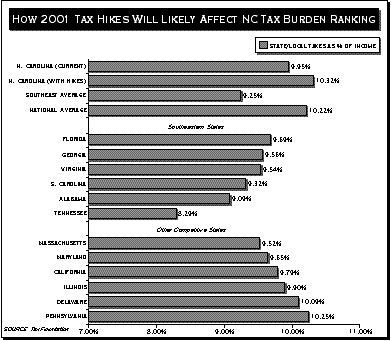Just weeks after ruling out significant, broad-based tax increases to help fund state spending growth over the next two fiscal years, Democratic leaders of the N.C. House of Representatives have now released a new package of proposed tax changes that would result in $633 million in new state and local taxes, with the state retaining $440 million in FY 2001-02.1 This massive tax increase would be layered on top of $50 million in higher revenue collections under Senate Bill 353, $61 million in “loophole closings” passed by the House, a $6 million tax increase associated with accelerated tax payments, the likely passage of $3 million in higher hotel taxes, and at least $140 million in higher property taxes enacted by counties last month.2
If the new tax-hike package is approved, North Carolina’s already deteriorating economic outlook will worsen considerably. A preliminary analysis of the proposed $395 million local-option sales tax alone suggests that it could cost more than 20,000 North Carolinians their jobs.3 Other elements of the tax-hike package include:
- A $251 million increase in personal income taxes, generated by creating a new rate of 8.75 percent on married couples earning more than $200,000 and singles earning more than $120,000. This tax increase on the state’s entrepreneurs, business executives, professionals, and other high-value workers would give North Carolina the 6th highest marginal income tax rate in the United States. Our top rate would be higher than the top rate in New York, New Jersey, Minnesota, and Ohio, among other states.4
- A $16 million increase in taxes on alcoholic beverages. Such selective sales taxes are already high in North Carolina and disproportionately affect lower-income residents.
- A $31 million increase in taxes on health maintenance organizations and Blue Cross-Blue Shield. This would come from levying a premium tax on these health plans for the first time, thus increasing the real cost to subscribers and possibly impacting the rate of North Carolinians who have private health insurance.
- About $62 million in offsetting tax reductions, stemming from an increase in the standard deduction for married filers ($41 million) and an increase in the child tax credit ($21 million). Unfortunately, these welcome tax cuts will do little to reduce the negative consequences of the package, which would impose a net state and local tax increase of about $633 million in FY 2001-02.
Our Competitive Position
According to our preliminary calculations, the passage of the House Democrats’ plan would have a dramatic impact on North Carolina’s competitive position. Even before this year’s tax hikes, North Carolina imposed the highest state and local tax burden in the Southeast at around 10 percent of personal income. As the nearby graph shows, our neighbors’ rates ranged from modestly lower (in Florida and Georgia) to significantly lower (in Tennessee and Alabama). But North Carolina’s effective tax rate has always been lower than the national average, helping to attract businesses and residents to the state.
This year’s tax changes promise to change the situation markedly. If the new $633 million tax-hike package is enacted (on top of state and local tax increases already approved so far in 2001) North Carolina will see its tax burden rise to 10.32 percent of income higher than the national average for the first time in state history, about 12 percent higher than the regional average, and well above the tax burdens imposed in states such as California, Pennsylvania, Delaware, Maryland, Massachusetts, and Illinois with which North Carolina competes for jobs, corporate headquarters, and business investments. Overall, North Carolina would rise six places in national tax burden rankings, to 22 out of the 50 states and the District of Columbia.5
This is a projection only; tax-law changes later this year in other states could change the rankings somewhat. However, since most states seem to be either holding the line or cutting taxes this year, the underlying message is undeniable: North Carolina is dangerously close to losing its competitive edge at a time when unemployment rates are already soaring in many communities across the state. Few economists, conservative or liberal, would advise policymakers to pass significant tax increases during economic downturns. Moreover, because budget proposals enacted by both the House and Senate still contain hundreds of millions of dollars in wasteful and low-priority spending and would increase state operating spending this year by at least 3.4 percent there are alternatives to raising North Carolina taxes to a high and uncompetitive level.
John Hood, President
Notes
- Richard Bostic, “Memorandum: House Tax Plan Summary,” Legislative Services Office, N.C. General Assembly, July 23, 2001, p. 1; and Dana Damico, “House Democrat plan would raise several taxes,” Winston-Salem Journal, July 24, 2001.
- The $50 million in enhanced tax collections is not, strictly speaking, a tax increase but it will increase total revenues and thus influence the relative rankings of states by tax burden. Other numbers are derived from House budget documents or from county offices.
- See John Hood, “Sales Tax Hike Kills Jobs,” Spotlight No. 200, John Locke Foundation, July 11, 2001.
- “State Individual Income Tax Rates as of Dec. 31, 2000,” Tax Foundation, www.taxfoundation.org/individualincometax rates.html.
- State rankings for 2001 by state/local tax burdens were obtained from Tax Foundation. Impact of tax package computed by adding state and local fiscal impact to North Carolina’s projected collections for 2001, then dividing by estimated personal income.
 Copyright 2001 by The John Locke Foundation, Inc.
Copyright 2001 by The John Locke Foundation, Inc.




